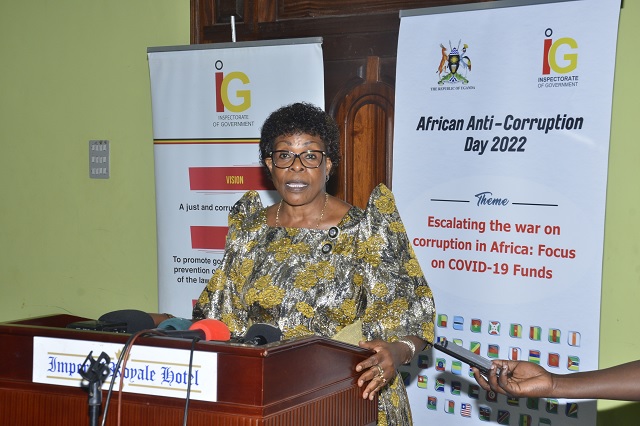
Kampala, Uganda | THE INDEPENDENT | The Inspectorate of Government (IG) handled a total of 320 disputes under the function of the ombudsman, over the year ended June 2022.
Most of these complaints arose from misunderstandings between public servants and their supervisors and they include abuse of authority, victimization, employment disputes, and non-payments among others.
The ombudsman is an official appointed and charged with ensuring that the rule of law and good governance are maintained by public officers, through investigation of administrative practices of public officers, apart from the anti-corruption and accountability functions of the IGG.
In Uganda, the Inspector General of Government is also the national ombudsman, while the duties are specifically handled by the Director of the Ombudsman Affairs.
The Directorate is also tasked with carrying out systems studies in various government departments and institutions which are continuously complained about by the general public, with a view of identifying long-term solutions to systemic bad governance or disrespect for the rule of law.
In their duties, the office says non-payment disputes amounted to 220, especially delayed or non-payment of gratuity, allowances, salaries, and pension.
Beti Kanya, the IGG, who is also the national ombudsman says that under this category, there were also many instances where the complainants did not fulfill some requirements, with others filing inconsistent documents or filing them late.
She was speaking on the Fifth World Annual Ombudsman’s Day which takes place every second Thursday in October.
Kamya used the occasion to explain the functions to the public and launch an awareness campaign for the public to know the extent to which the office can be used in handling disputes.
Underemployment disputes, most cases relate to irregular recruitment, especially in local governments, ministries, departments, and agencies.
The Acting Director of Ombudsman Affairs, Justus Kareebi says they have proved many cases of people being recruited without fulfilling the requirements of the recruitment process.
Asked about what happens when such irregularities are discovered, Kareebi said the agency has several options regarding sanctions, including recommending reversals of the appointment, recommending punishment of the officials involved, or prosecution where there is a criminal element.
This year’s theme of the day is “Resilience, Respect, Resolve,” according to International Ombudsman Association.
Kamya says they are now investigating other public service sectors including Mulago hospital, the roads sector, and reports will soon be made.
Going forward, the IG says they have started holding community engagements (Baraza) to encourage the common citizens to demand better public services through the office.
One of the achievements, according to Kamya is the arrest of the Fort Portal City Clerk, Moses Otimong, last week after the residents at their first Baraza accused him of abuse of office, especially absenteeism.
Otimong was arrested on the orders of the Deputy Inspector General of Government, Anne Twinomugisha Muhairwe who presided over the Baraza.
Kamya says such public hearings will be extended to other cities and local governments.
There have been complaints about the inspectorate being selective when applying the law, preferring to prosecute lower-level government officials, and leaving the real culprits free, hence the term ‘big fish’.
Kamya says this mainly arises from the concerned person who should be the complainant, who is threatened into silence. She also says that the ‘big fish’ usually take advantage of the vulnerability of their subordinates, who at the end of the case find themselves being pinned by all the evidence and the sponsor of the crime goes free.
She also urged the public not to be intimidated by anyone who claims to have high connections or working for high offices, to deny them their rights, saying the only person who cannot be prosecuted is the President.
On the importance of public involvement, the IGG says the public should have a ‘sense of entitlement and demand what is due to them because they are the main victims of bad governance.
She gave an example of how absenteeism can affect service delivery and even economic activity, especially when one has to spend days seeking the attention of an absentee officer.
In December 2021, the IG launched the lifestyle audit campaign as one of the tools to fight corruption.
Under this campaign, the IG is supposed to lead investigations of properties owned by public servants and especially if they are not part of the declared properties.
This is aimed at recovering money spent to acquire such properties should they be found to have been acquired using stolen money.
Presiding over the event however, President Yoweri Museveni cautioned the IGG to go slow on such properties because ‘owners of such could decide to smuggle their stolen wealth out of the country.
This seemed to have deflated Kamya’s effort.
However, she says the campaign continues and that it is a people-based campaign because it is the people who are the first witnesses when a property is constructed within their localities and they cannot explain the source of the funds.
Even the cases currently being investigated were reported by members of the public, according to her.
*****
URN
 The Independent Uganda: You get the Truth we Pay the Price
The Independent Uganda: You get the Truth we Pay the Price



 Anthony Natif notes from Court: Prosecution case enters final stretch
Anthony Natif notes from Court: Prosecution case enters final stretch
